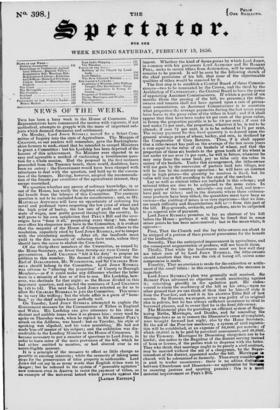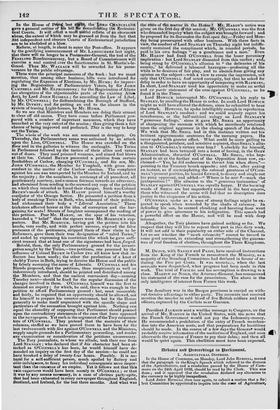In the house of Peer4 last *lit, the LORD CHANCELLOR
gave a general outline of his bill most Consolidating- the Ecclesias- tical Courts. It will effect a most useful reform of an enormous abuse, the extent of which may be guessed at from the fact that 386 independent and obscure Courts of Ecclesiastical jurisdiction are to be abolished at a blow.
Reform, at length, is about to enter the Post-office. It appears by the gratify ing announcement of Mr. LAHOUCIIERE last night, that there will no longer be a Postmaster-General, the tool of the FasEurro Bumbureaucracy, but a Board of Commissioners will exercise a real control over the functionaries in St. Martin's-le- Grand. Thus Mr. WALLACE will be rewarded for his perse- verance by the public advantage. These were the principal measures of the Beek : but we must mention, that among other business, bills were introduced for regulating the Expenses of Elections, by Mr. HUME; for improv- ing the Registration of Parliamentary Voters, by Sir JOHN CAMPBELL and Mr. ELPHINSTONE ; for the Registration of Aliens (an abrogation of the objectionable parts of the existing Allem Act), by Lord JOHN RUSSELL; for amending the Law of Libel, by Mr. O'CONNELL; for disfranchising the Borough of Stafford, by Mr. D1VETT; and for putting an end to the abuses in the system of leasing Light-houses, by Mr. Hums. So we see that Ministers and Members are doing their utmost to clear off old scores. They have come before Parliament pre- pared with a number of important measures, which they have launched at the very outset of the session; thus giving them a fair chance of being improved and perfected. This is the way to keep out the Tories.
The whole of the week was not consumed in drudgery. On Thursday, the Parliamentary arena was enlivened by an attack upon the Lion, O'CONNELL. The House was crowded on the floor and in the galleries to witness the onslaught. The Tories in Parliament followed up the tactics of their allies and tutors out of doors. They used poisoned weapons, and aimed foul blows at their foe. Colonel BRUEN presented a petition from certain freeholders of Carlow, charging O'CONNELL, and his son, Mr. JOHN O'CONNELL. the Member for Youghall, with gross mis- conduct in the matter of the Carlow election. The complaint against his son was unexpected by the Member for Ireland, and by the majority ; for the assailants, in contempt of all precedent, all gentlemanly courtesy, and common fairness towards an adversary, had abstained from sending to the accused any copy of the petition on which they intended to found their charges. Such was Colonel 13EuEses mode of attack. Mr. HARDY proved himself a worthy coadjutor of the Orange faction. He presented a petition from a body of sneaking Tories in Bath, who, ashamed of their politics, had nicknamed their body a " Liberal Association." These tricksters affected horror at the idea of corruption and the bar- gaining for seats! Shouts of laughter accompanied the reading of this petition. Poor Mr. HARDY, on the spur of his vexation, hazarded a " belief that the signers were Mr. ROEBUCK'S sup- porters. But Mr. ROEBUCK, having got the petition into his hands, very coolly, and with perfect success, exposed the false pretences of the petitioners, stripped them of their claim to be Reformers, gave them their true designation of " rabid Tories," and ended by expressing his conviction (for which he gave suffi- cient reason) that at least one of the signatures had been forged. Behold, then, the only Parliamentary ground for the investi- gation sought by the Tories,—two petitions, one procured by the influence of Colonel BRUEN in Carlow (we all know how that in- fluence has been used); the other the production of a knot of shabby Tories in Bath, trying to deceive the House and the public by falsely assuming the name of Liberals. O'CoNsrs.u. and his friends proposed, that the petitions, thus suspiciously as well as indecorously introduced, should be printed and distributed among the Members, and that the earliest convenient day—naming Tuesday next—should be fixed for the regular discussion of the charges involved in them. O'CONNELL himself was the first to demand an inquiry ; for which, he said, there was enough in the petition to afford Parliamentary ground : but, most reasonably and fairly, he required that an opportunity should be allowed, nut for himself to prepare his counter-statement, but for the House generally to make itself acquainted with the specific shape and particulars of the accusation brought against him. Nothing can equal the absurdity of supposing that Parliament should proceed
upon the contradictory statements of the case that have appeared in the newspapers. Yet such is the argument of the Tory calumnia- tors of O'CONNELL. They pretend that the contents of their
columns, stuffed as we have proved them to have been for the last twelvemonth with lies against O'CONNELL and the Ministers,
supply ample grounds for a Parliamentary proceeding, and render
any examination or consideration of the petitions unnecessary. The Tory journalists, to whom we allude, took their cue from Lord STANLEY; who declared that if his character had been at-
tacked as O'CoNNELL's has been, he would himself have de- manded an inquiry on the first day of the session—he could not have brooked a delay of twenty-four hours. Possibly. It is na- tural for a self-sufficient person, much spoiled by flattery and over-indulgence, to fancy his individual consequence more impor- tant than the concerns of an empire. Yet it follows not that this vain eagerness would have been seemly in O'CONNELL; or that it was by any means necessary, in a case of obvious party-spite, that had been exhausted in every newspaper throughout England, Scotland, and Ireland, for the last three months. And what was
the state of the matter in the House ? Mr. HARDY'S notice was given on the first day of the session ; Mr. O'CoNNEI.I. was the first who demanded inquiry when the subject was brought forward ; and he proposed for its discussion the first open day,—Friday and Mon- day being preoccupied with other business. With these facts in view, the conduct of Lord STANLEY on Thursday night but indiffe- rently sustained the compliment which, in rounded periods, he paid to his own feelings " as a gentleman and a man." Even Mr. HARDY had freed O'CONNELL from the baser pecuniary implication : but Lord STANLEY dissented from this verdict ; an being stung by OCONNELL'S allusion to " the delicacies of his enmity," he delivered a laboured harangue—professing all the while to be desirous of fair play, and to abstain from giving any opinion on the subject—with a view to create the impression, not only that O'CONNELL had acted corruptly, but that ho asked for delay in order to have an opportunity of tampering with RAPHAEL. In short, Lord STANLEY used his opportunity to make an artful and ex pane statement of the case against (nostrum., as he ay
found it in the Times. 0
Lord HOWICK interrupted Mr. O'CONNELL in his reply to STANLEY, by recalling the House to order. In sooth Lord Howtcsc might as well have allowed the defence, since he submitted to hear the attack. However, he spoke intelligibly enough in reprobation of Lord STANLEY'S conduct : and we could scarcely regret his interference, or the half-satirical eulogy on Lord STANLEY'I "generous feelings," since it gave Mr. Smut an opportunity of sharpening the sarcasm with which he mercilessly retaliated upon the original aggressor in the closing speech of the debate. We wish that Mr. SHELL had in this instance written out his brilliant epigrammatic sentences for the morning papers. He never spoke with greater effect. What could be more galling to a disappointed, petulant, and sensitive aspirant, than SBEIL's allu- sion to O'CoNNELL's victory over him? L ['luckily for himself, STANLEY had been betrayed into a boast of having, in the GREY Administration, thwarted O'CONNELL. Mr. SHELL, who hap- pened to sit at the further end of the Opposition front row, ex- claimed—" Yes, he did endeavour to thwart him when there,"— pointing to the Treasury bench opposite; and then, after gazing an instant, as if contemplating the colossal greatness of O'CON-• NELL'S present position, he leaned forward, to descry and single out his puny opponent, and added—" Where is he now P—mark the juxtaposition !" His allusion to the " generous insinuation" of STANLEY against O'CONNELL was equally happy. If the burning words of SHE1L are but imperfectly traced in the best reports, those who witnessed the scene will feel that no description does justice to the eloquence of his action. O'CONNELL spoke as a man of strong feelings might be ex- pected to speak when wounded by the shafts of calumny. In defending his son, he seemed choaking and bursting from want of power to give utterance to his indignation. This speech bad a powerful effect on the House, and will be read with deep interest.
Altogether, the Tory plotters have gained nothing so far. We suspect that they will live to repent their part in this dirty work. It will not add to their popularity on either side of the Channel. Let us see whether the " mock solemnity " cannot be turned to some good account, in extending and strengthening the guaran- tees of real freedom of election, throughout the Three Kingdoms.



























